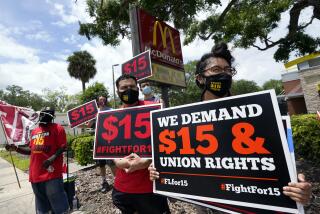Wage, Tax Votes to Test Clout of Small Business
- Share via
Small business will test its political muscle next week when Congress takes up a vote on the minimum wage and considers a $7-billion package of small business tax measures.
The last time the minimum wage was raised, in 1989, the voice of small business was barely a whisper over the roar of labor unions and big corporations.
But this time, small business has dominated the debate.
Although the half-dozen Washington-based small-business lobbies have not beat back the pay raise--a potent election-year issue--they nonetheless managed to wring out as compensation a list of long-sought-after measures that are likely to pass Monday.
“The small-business lobby hasn’t always been so successful, but after the White House Conference on Small Business in 1995, things began to change,” said Judith Meador, publisher and editor of the St. Louis Small Business Monthly.
Congress and President Clinton “have begun to realize that big business is laying people off and that future jobs are going to come from small business,” Meador said.
Small-business associations now are considered key economic players in debates on the Hill, said Bennie Thayer, head of the National Assn. for the Self-Employed. Small-business leaders get quoted in the media more frequently than many Congressional members, and top-ranking Capitol politicians ask them to help write pro-small-business legislation, said Jamie Wickett, a lobbyist for the National Federation of Independent Business.
Joel Kotkin, a senior fellow with the Pepperdine University Institute for Public Policy, believes that although small business still lacks the clout wielded by big corporations, labor unions and teachers, ignoring small business today is risky for politicians.
“If you hurt small business . . . they can make things happen,” Kotkin said. “It doesn’t take that much of small business to switch over to a political party to make a big difference.”
Key to the change in the political climate has been the trend of downsizing. Many of the employees shed by Fortune 500 companies and federal, state and local governments have gone on to start their own companies.
With 54% of the nation’s employees currently working in small businesses and 98% of all jobs since 1989 being created by businesses with fewer than four employees, Congressional leaders have come to recognize that small-business issues are the nation’s economic issues, small-business leaders say.
Indeed, Arnold Packer, senior fellow at the Johns Hopkins Institute for Policy Studies and former chief economist for the Senate Budget Committee, noted that “the small-business lobby has always been extraordinarily powerful.”
The NFIB, 600,000 members strong, has played a key role in building that clout. The organization counts 1,000 members in every Congressional district and mobilizes them in grass-roots lobbying efforts.
Other key small-business players include the 327,000-member NASE, which represents the “smallest of the small” businesses, those with fewer than four employees; National Small Business United, at 59 years old the nation’s oldest small-business association; and the more recently created Small Business Survival Committee, which seeks to do away with all government subsidized business programs. The four groups together represent more than 1.3 million business owners nationwide.
“Within the past year to two years, the groups have come together more than I have seen them come together in my 10 years as a small business advocate,” Thayer added.
Small business demonstrated its newfound clout in 1994 when, displeased with Clinton’s 1993 tax increase and his proposed employer-mandated health care plan, they went to the polls and helped vote in business-friendly Republicans to take control of the House of Representatives, said John Galles, NSBUpresident.
Now those same Republicans are working diligently to retain small-business votes by pushing for small-business legislation, Galles said.
Similarly, Clinton has become more small-business-friendly in the past two years, small-business leaders said. He convened the 1995 White House Conference on Small Business, bringing together nearly 2,000 small-business owners from across the country and has pushed for many of their recommendations.
The small-business proposals to be considered next week have been long sought by small business owners. Some were previously vetoed by Clinton and have been revived in the new political climate. They have been gathered together and collectively titled the Small Business Jobs Protection Act of 1996.
They include six basic provisions:
1. Work opportunities tax credit: Employers would get a tax credit for a portion of the salaries paid employees who are welfare recipients, ex-felons, vocational rehabilitation referrals, veterans on foods stamps, high-risk youths or those seeking summer jobs.
2. Increased expense deductions: A business with less than $200,000 in equipment expenses could claim up to $25,000 in business deductions annually, up from the current $17,500 annually. The increase would be phased in by the year 2003.
3. FICA tip credit: Restaurants would be able to claim a tax credit on FICA taxes paid for workers delivering food off-premise.
4. Employer-provided educational assistance: Employees will be exempt from taxes on up to $5,250 of employer-paid educational benefits.
5. S-corporation reform: Small businesses would be able to get more capital through modifications in the laws that apply to S-corporations, a form of partnership that permits corporate income to be taxed at the generally lower personal income rates. Among the changes would be to increase the number of shareholders from 35 to 75, let S-corporations own 100% of another corporation instead of limiting them to 80% ownership, and permitting tax-exempt organizations, small banks and retirement plans to hold S-corporation stock.
6. Pension reform: Small businesses could eliminate the average $2,000 cost of implementing pension plans and the administrative headaches under the Republican-sponsored Savings Incentive Match Plan for Employees, or SIMPLE. Under the plan, regulations would be eased to enable small employers to offer Individual Retirement Accounts for each employee or part of a qualified cash or deferred 401(k) plan. In addition, the measure would abolish the requirement that employees must be enrolled before business owners can enroll themselves in the plan.
Pension reform, Thayer said, has for years been a core issue for his organization. He added that a recent poll of his members indicated that more than 50% had no pension plan in place.
Wickett added that some of the measures would provide only a few thousand dollars of relief, such as allowing a bakery owner to deduct the entire cost of a new delivery truck now instead of over 10 years. But he said that can mean the difference between profits and losses, success and failure for small companies.
More to Read
Sign up for Essential California
The most important California stories and recommendations in your inbox every morning.
You may occasionally receive promotional content from the Los Angeles Times.













